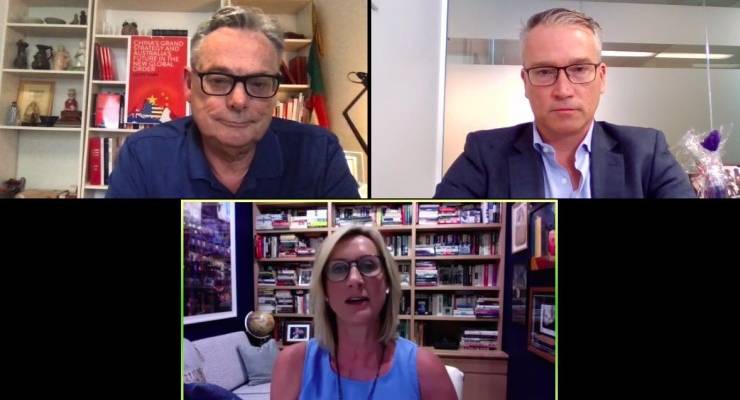
Australia is very much on its own in the Asia-Pacific region and will have to devise much more authentic foreign policy than it has for many decades.
That’s the blunt verdict of former Australian ambassador to China Geoff Raby, speaking last night alongside Centre for Independent Studies executive director Tom Switzer in a talk hosted by Crikey columnist Janine Perrett for Crikey Inside Access subscribers
The overriding theme of the talk was how Australia navigates its relationships with, as Switzer put it, an increasingly assertive China — Australia’s key trade partner — and an increasingly erratic United States — Australia’s most important security ally.
While both speakers agreed that the tone of the relationship between the two major powers would soften under a Joe Biden presidency, Switzer argued that Donald Trump’s tenure had “upended the Washington consensus” on China.
“The consensus now is that America will go to great lengths to stop China from dominating the region, it’s a view held by Republicans and Democrats, and I don’t think that will change, particularly given Biden will be surrounded by unapologetic advocates for US global leadership,” he said.
One of Raby’s solutions to Australia’s dilemma was greater engagement with other countries in the region, who have similar or worse issues with China.
“But we neglect those relationships. We haven’t had a bilateral prime ministerial visit to Thailand since the late ’90s … We don’t really deal with the Philippines,” he said.
Citing the example of Japan, which maintains full engagement with China despite territorial friction between the two, Raby said “we’ve managed to maneuver ourselves into being an outlier. No other country in south-east Asia has managed to work itself into the pickle we find ourselves in today”.
On the issue of China’s record on human rights, both speakers stressed a need for pragmatism on Australia’s part.
“It’s a very difficult thing,” said Raby. “But we have to, I think, pick our fights, pick the issues where we think we can make a difference … and persistently and consistently maintain our position.
“But just public statements from time to time, without any real follow-up or consistency, are not going to help the cause of improving human rights in China.”
China’s behaviour was not unusual for a rising world power, Switzer said:
“As their economic and military powers increase, they seek a sphere of influence in areas on which their security and prosperity depend … [But] the United States as the reigning superpower in the region will go to great lengths to stop China. It’s going to be a very tense 10 to 20 years for policy makers in Canberra, trying to ride those two horses simultaneously.”
Raby said Australia didn’t have to see China as “as an enemy or a strategic competitor”.
“We have no historical animosities, we have no territorial disputes, we’re not a great power resisting their rise like the US. In terms of the domestic debate, unfortunately, that’s now being framed as a choice between sycophancy or hostility,” he said. “There is plenty of scope between those ends of the spectrum for diplomacy and engagement.
Australia, he believes, faces “a dystopian future, something like we’ve never had to navigate before. We have to figure out how to navigate our way through that, we have no choice. And it will be a major test for diplomacy.”








Unfortunately, for the government, and most of the political class, the choice is between 2 forms of sycophancy. To do otherwise takes a spine they conspicuously lack.
The LNP (and lesser extent Labor) have a generation of monocultural MPs who have been exposed to decades of dog whistling in thier caberra bubble and are prepared to have Australia cut its nose to spite its face on trade with PRC.
Any outcome will have no material impact on their personal income from their political careers aka UK’s Brexit but long term implications for economy and society; climate warming too.
They create an awful of noise in the present and demands for urgent action, that seem to benefit e.g. the US and its ideologues, but seems more about theatre than well thought out policy and strategy for Australia?
It needs to be said that Morrison’s insulting call for an inquiry with the powers of weapons inspectors was made in the full knowledge of the repercussions on trade. It was made for domestic political purposes and so breached his most fundamental duty ….. to act in Australia’s best interests.
Probably also trying to share, if not get into, Trump’s big-boy pants.
The China debacle, and no mistake – that’s what it is, is reminiscent of the failed invasion of Afghanistan. What is the end game? What is the exit strategy? How will all this play out?
What were the aims of ‘outing’, that is, humiliating China over COVID-19? When those who devised the gambit sat around the big table, did anyone say, ‘well, how is China going to respond to this?’ ‘And what will our response be to china’s response?’ and so on.
So now we can’t back down, and China won’t back down. What happens next?
Surely after Iraq and Afghanistan one would have learnt that you don’t commit to any conflict without knowing how it will end? Amateurs!
China may be a totalitarian dictatorship but they don’t pretend otherwise.
We sell far more to them that we buy from them – the exact opposite of the USA which, for the last 50yrs, has had a substantial trade surplus, esp heavy agricultural & mining machinery, over us.
Considering some other ‘allies’ forced onto this country by the USA, eg the Saudis – another country running a huge trade surplus against us, we could not do much worse by standing back and waiting for the USA to come to, what passes for, its senses.